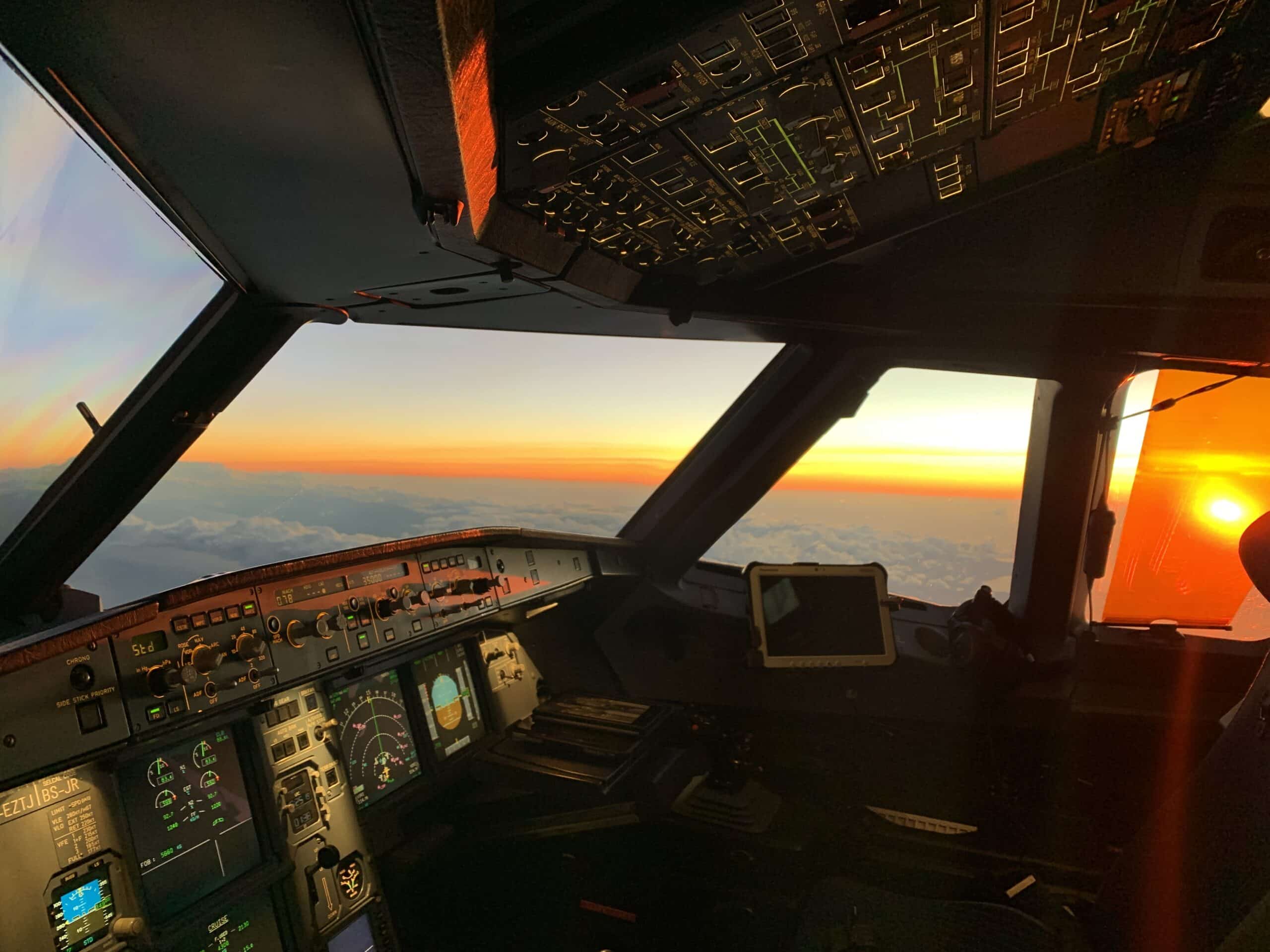It’s 7pm and dark outside. We’re sat at 38000ft in the cruise over Croatia on the way back to London. Today we’ve already flown from London to Egypt and we’re on our return leg. With the slot delay we’d absorbed in Egypt, the duty was going to a fraction over 14 hours long by the time we land in London. The FO and I can already feel the fact we’ve been sat in our seats now for 11 hours straight. We’re both exhausted and looking forward to getting back to the UK.
A call from the cabin interrupts our conversation. I’m PM (pilot monitoring) so I put my headset on and answer the call, expecting it to be our regular check in to see if we’d like anything (in the cruise we tend to take our headsets off for comfort and listen to radio calls through a loudspeaker). I hear slight panic in the cabin managers voice as she begins to inform me we have a poorly child on board. I immediately turn my loudspeaker back on so the FO can also now hear the conversation. This saves me having to relay everything after the call and if it’s serious, every second could be precious.
We’re told that a young boy has stomach pain but it isn’t too severe, however the crew have already taken it upon themselves to do a PA asking for a doctor on board. Luckily a doctor had come forward and was helping the child, but believed no action on our part was required in terms of changing the trajectory of the aircraft. We were already flying as fast as we could on a direct routing to London, so I just asked the CM to check in with us every 20 minutes with an update.
Although it sounded pretty benign at this stage, myself & the FO had a chat about possible diversion airfields. The weather in Venice looked good and was right infront of us now. Milan was verging on LVP’s (low vis procedures). Zurich was the other side of the Alps, a little further into the flight, but the weather looked good there. We nominate Venice as our ‘Plan A’ for now should anything happen.
20 minutes later, now overhead Venice, another call came. The situation with the boy was improving. We could relax a little.
10 minutes later, now over the Alps, another call came from the crew. It had taken a slight turn. The doctor was recommending the boy get medical care when he got back to London. I send a message to company using our ACARS system just to let them know and see if they can organize someone to meet the boy at the gate. Another 5 minutes later, another call, the Doctor said the boy would now need urgent care upon landing back into London. I asked if the doctor thought it a viable option to continue to London and be met by medical services at the stand. They said they’d be happy with this. I discussed a plan with the FO; we’d wait until we’re entering London airspace, then declare a pan. I couldn’t see the benefit of declaring one in our current position. We already had a direct track to London and were still flying as fast as we could. Once declared in London, we’d likely be very well looked after and get a straight in approach to our destination. The situation is clearly dynamic, so we still discuss our diverting options.
5 minutes later, another call. We’re told the child had now dropped out of consciousness and the doctor said we need to get on the ground ASAP! Suddenly the adrenaline starts pumping, but the training also kicks in. I told the CM we’d be diverting and that I’ll call her back with more info shortly. We’d nominated Venice 30 minutes ago as our diversion airfield, but we were now almost overhead Zurich. Milan would be commercially preferable for the divert, however it was a) further away and b) on the limit of LVP’s which would mean we’d be conducting an auto-land which brings with it plenty of threats and a much higher workload.
We both quickly agree Zurich is a suitable option and it’s right underneath us. I declare my first ever pan over the radio and request an immediate diversion to Zurich. It’s a radio call I’ve made in the simulator copious times, but this is different, this is for real. I make a conscious effort to keep my transmission as clear and calm as I can, despite definitely being able to feel the adrenaline.
Swiss ATC were incredible. They instantly gave us a radar heading and a large descent clearance.
I tell the FO to keep control of the aircraft and get us down as quickly as he can, whilst I verbalize the list of things I need to get done before we touchdown so he’s in the loop. Aware we’re over the Alps, I select terrain on my nav display and verbalize our MSA (Minimum Safety Altitude). He does a great job of winding the aircrafts speed up to increase our rate of descent, and I give him a nudge to put the speed brake out to get us down even quicker.
Whilst he does that, I’m setting up the box (programming the approach into the aircrafts computer system), liaising with ATC which runway we’ll be on and passing them details of the young boy.
In between this I’m also monitoring the trajectory of the aircraft and checking I’m happy with it. Whilst the guy next to me seems slick, I’ve never met him before today let alone flown with him. Whilst I have huge faith in our pilot training department, we’re descending at a high rate into a mountainous area, so it’s imperative I keep good situational awareness whilst managing all the other bits. I blast a very quick typed message out to our company “Div ZRH due Medical”. Seems short, but at this stage that’s all the information they need to get the ball rolling on what they’ll need to do their side. They can start tee-ing up what will happen once we’ve offloaded the boy. I call the CM to do a very quick brief over the interphone, and ask them to secure the cabin for landing. Before doing a short PA to the passengers I take a few slow, deep breaths. I want to exude calmness and reassurance when in reality, things are happening very fast in the flightdeck. I keep it short and sweet, let them know what’s happening and why, and explain I’ll give further information on the ground.
Only a few minutes have gone by since the call at 38000ft and we’re now plummeting through 10,000ft. I run through the box again and give the FO a quick brief on how I plan to fly the approach. He’s done a grand job of getting us down quickly. Part of me is tempted to let him keep control and do the landing himself. He’s in the groove of flying the aircraft and by leaving control with him, I have more capacity to monitor everything. The only reason I don’t is that the absolute last thing we want here is a go-around. I want it on my shoulders if that does end up happening. I also don’t know his ability, whereas I do mine.
I take control as we’re on base leg and ask him to have one more check through the box, and verbalize a final review of what we’re doing. It’s a good tool to catch any last-minute errors, and by asking the FO to verbalize it rather than me doing the talking again, it ensures we’re both on the same wavelength. We also ask ATC where our stand will be ahead of time, so we can check a rough taxi routing now so we know what to expect.
I try and find a fine balance on the approach between leaving our speed as high as possible until as late as possible before we configure the aircraft, but without risking a go-around that would cost us another 5-10 minutes in the air, which could mean the difference between life & death for the young child.
At 500 feet we check the aircraft, but I also check myself and the FO. Again, I make an effort to slow my breathing down and focus on the landing. We’ve now been flying for 12 hours. It’s total darkness outside and although we now feel alert and pumping full of adrenaline, deep down we’re both shattered.
Exactly 15 minutes after receiving the call to divert, our wheels touched down on Zurich’s runway. This is a figure I’m quite proud of!
After a rapid taxi to stand, paramedics board and offload the child. I’m already on the phone to our company, trying to figure out a way to get our passengers home tonight. I know we must be very tight on legal hours but haven’t had time to work out just how tight now that we’ve technically added another sector to the day.
Crewing informs me that due to the divert adding another sector, there was no legal way for us to operate the flight back tonight even if we were happy to go into discretion. There were also no crews available in Zurich to operate the plane. This news was gutting.
With the early heads up we’d given the company during the descent, they’d already had time to arrange hotels and transport for all passengers which was very helpful.
In all honesty, I would rather be anywhere else than having to stand infront of 200 people, whilst absolutely knackered, to tell them that we can’t get them to their destination tonight.
Being an introvert, I’d feel so much more comfortable making this PA from within flightdeck but I feel it’s my duty here to stand at the front of the cabin to make this one.
Whilst there were initially lots of disappointed noises, as a whole the passengers were extremely understanding. It was nice to be able to share with them that everything had been booked already including their flight home in the morning.
Once all the passengers were off, we decided we’d have our de-brief at the hotel once we arrived. It gave people time to wind down slightly and reflect on things. It was a sleepless night for me, with my head running through the evenings events and trying to work out if we’d done anything wrong or could have done anything better. The next morning we headed back to London as passengers. This time, smelling like a crew who were all wearing yesterdays uniform (and for some us, yesterdays underwear).
All in all, I’m happy with how the situation was handled. Whilst I always look for ways to improve, upon reflection there wasn’t much that any of us would have done differently. We did what we thought was the best thing to do at that time, given the information we had. We executed it well and it was a safe outcome. We heard the next day that the boy was still in hospital but was stable which was great news.
Share post with a friend:









